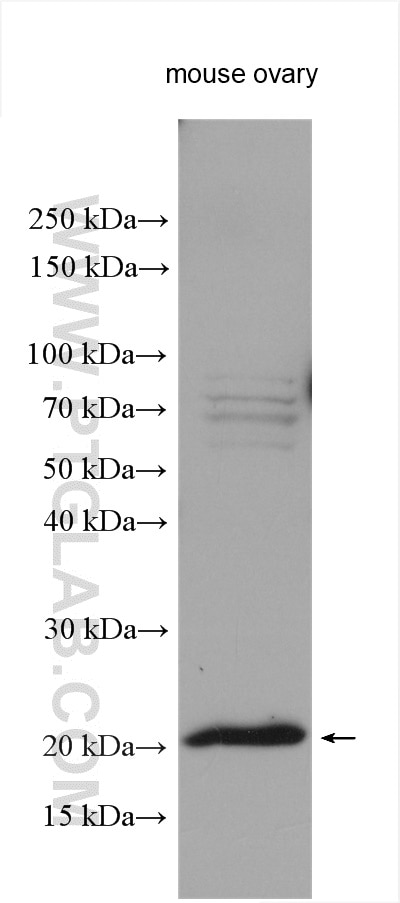Anticorps Polyclonal de lapin anti-DDIT4L
DDIT4L Polyclonal Antibody for WB, ELISA
Hôte / Isotype
Lapin / IgG
Réactivité testée
souris
Applications
WB, IHC, ELISA
Conjugaison
Non conjugué
N° de cat : 12094-1-AP
Synonymes
Galerie de données de validation
Applications testées
| Résultats positifs en WB | tissu ovarien de souris, |
Dilution recommandée
| Application | Dilution |
|---|---|
| Western Blot (WB) | WB : 1:500-1:2000 |
| It is recommended that this reagent should be titrated in each testing system to obtain optimal results. | |
| Sample-dependent, check data in validation data gallery | |
Applications publiées
| WB | See 1 publications below |
| IHC | See 1 publications below |
Informations sur le produit
12094-1-AP cible DDIT4L dans les applications de WB, IHC, ELISA et montre une réactivité avec des échantillons souris
| Réactivité | souris |
| Réactivité citée | souris |
| Hôte / Isotype | Lapin / IgG |
| Clonalité | Polyclonal |
| Type | Anticorps |
| Immunogène | DDIT4L Protéine recombinante Ag2735 |
| Nom complet | DNA-damage-inducible transcript 4-like |
| Masse moléculaire calculée | 193 aa, 22 kDa |
| Poids moléculaire observé | 22 kDa |
| Numéro d’acquisition GenBank | BC013592 |
| Symbole du gène | DDIT4L |
| Identification du gène (NCBI) | 115265 |
| Conjugaison | Non conjugué |
| Forme | Liquide |
| Méthode de purification | Purification par affinité contre l'antigène |
| Tampon de stockage | PBS avec azoture de sodium à 0,02 % et glycérol à 50 % pH 7,3 |
| Conditions de stockage | Stocker à -20°C. Stable pendant un an après l'expédition. L'aliquotage n'est pas nécessaire pour le stockage à -20oC Les 20ul contiennent 0,1% de BSA. |
Informations générales
DNA-damage-inducible transcript 4-like protein(DDIT4L), encoded by the stress responsive gene REDD2, is a negative regulator of mTOR signaling, and expressed predominantly in skeletal muscle. It regulates the TOR signaling pathway upstream of the TSC1-TSC2 complex and downstream of AKT1. Also, DDIT4L involves in oxidized low-density lipoprotein-induced macrophage death sensitivity.
Protocole
| Product Specific Protocols | |
|---|---|
| WB protocol for DDIT4L antibody 12094-1-AP | Download protocol |
| Standard Protocols | |
|---|---|
| Click here to view our Standard Protocols |
Publications
| Species | Application | Title |
|---|---|---|
J Cell Sci Oocyte-dependent activation of MTOR in cumulus cells controls the development and survival of cumulus-oocyte complexes. | ||
Am J Physiol Endocrinol Metab Disruption of REDD1 gene ameliorates sepsis-induced decrease in mTORC1 signaling but has divergent effects on proteolytic signaling in skeletal muscle. |


